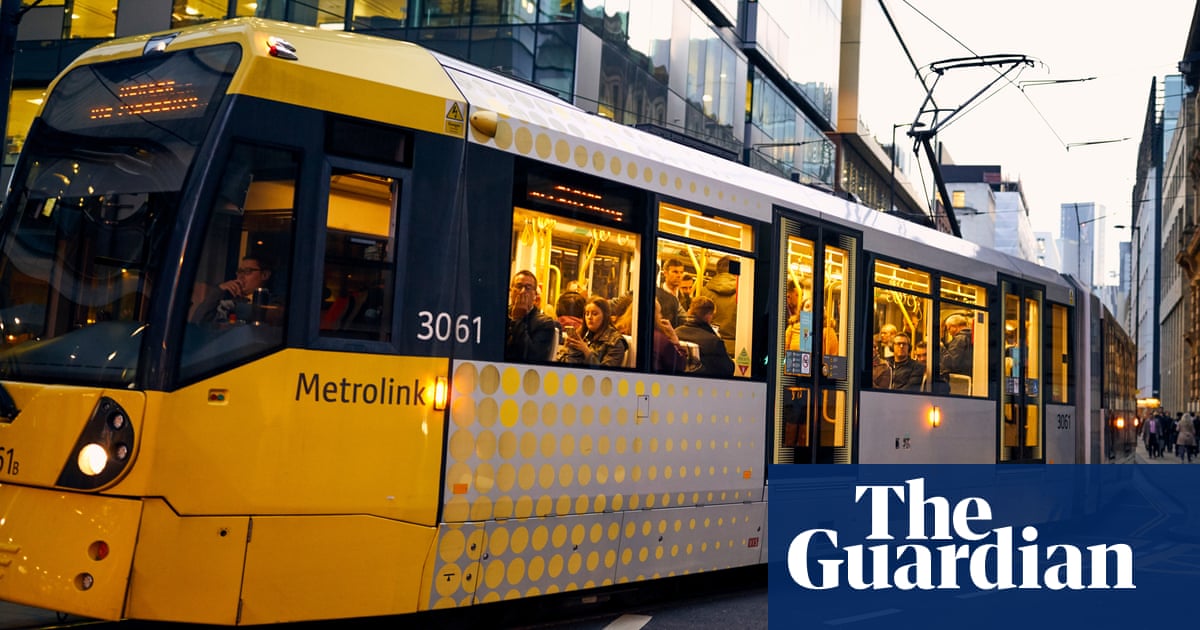“Dread” might not be the first word Mancunians reach for to describe their daily commute, but for Ross Kenyon, 45, reluctantly waiting at a tram stop on a cloudy morning in centralManchester, it’s the feeling clawing at his body.
Why? He hates the tram. So much so, he refuses to take it to work, preferring a half-hour walk to his office instead. He says the the buses are even worse. He avoids them completely.
The reason, he says, is antisocial behaviour. He’s become increasingly bothered by people playing music out loud or vaping on public transport.
“You get on the trains or trams, especially on a Friday or Saturday night, and there are people with the speakers and music and it’s just impolite … It just aggravates me,” said Kenyon, who works in trading. “I go to Dubai quite a lot and everything’s all nice. But here, it’s like there’s no rules any more. It’s not that I’m the fun police. I just find it annoying.”
Music to his ears, however, was the news that the Liberal Democrats are proposing toban playing musicand TV shows out loud on public transport.
Under the plansannounced on Wednesday, people booming out their favourite tunes or shows from their phone on public transport, or while at stations or bus stops, could face a maximum fine of £1,000.
Reena, 41, a journalist sitting on a tram heading out of the centre towards the city’s media hub, shared Kenyon’s disdain for loudspeakers.
“I hate it. I think it’s really unsociable,” she said. “I have less tolerance for it now that I’ve got kids … I do understand when you’re young and you want to listen to music together, but I just don’t think it should be when there’s lots of other people, especially if I’m with my kids and they’re having a nap or something. It’s unnecessarily loud.”
For Sarah Hastings, a music teacher in her 50s, it was not playing music out loud that was the problem but the lyrics.
“If it’s just background music, mood music, whatever, that’s not going to offend anybody. It’s not the music. It’s the words. Sometimes there are young kids around and it’s loud and it’s language that they could do without hearing,” she said.
To implement the ban, theLiberal Democratsare proposing amendments to the bus services bill, which is going through parliament. As transport policy is devolved, the move would only apply to England.
Sign up toFirst Edition
Our morning email breaks down the key stories of the day, telling you what’s happening and why it matters
after newsletter promotion
Jessie Were, 28, who works for the local council, described his commute into the centre as relatively quiet. On the occasion he does hear music on a tram or a bus, it doesn’t bother him.
“Sometimes I like music. If it’s a song I like, I vibe with it,” he said. “I think they [the Liberal Democrats] should have other things to focus on. Music on buses and trams. It’s really a non-issue.”
He was not the only one who felt at odds with the proposal. Kayes Syed, 48, a lawyer, said: “I don’t have a problem with it. It’s not rude. It’s quite nice, actually. I’m a bit grumpy in the morning, so things like that just cheer me up. I’d rather them [the Liberal Democrats] focus on homelessness, drug abuse or crime rather than playing music.”
